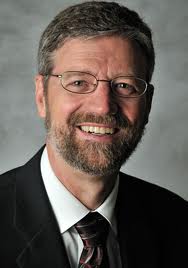By Ervin Stutzman
In a workshop I attended recently in Wellman, Iowa, I was prompted to think more broadly about the pastor’s role as a steward in the congregation. It expands my understanding of the financial implications of stewardship to include not only cash, but other forms of capital needed for the church to thrive.
Broadly defined, much of a pastor’s work has to do with building the capital of a congregation on behalf of God’s mission in the world. That’s what I took from the workshop that brought together church leaders and business leaders for conversation the week before Thanksgiving.
David B. Miller, professor at Anabaptist Mennonite Biblical Seminary, provided much of the grist for the conversation as he reflected on a theology of leadership for business leaders and pastors. He testified to a shift in his thinking about money when he got married. Having grown up in the home of a blue collar worker, he had always thought of money as cash to be earned, spent or saved. After his marriage to the daughter of a prominent businessman, he came to understand the value of capital, the money invested to gain equity in a business. He urged us to consider how the concept of Jubilee calls us to engage in actions that release or redistribute all forms of capital to bring God’s healing and hope to the world.
The ensuing conversation reminded me of the way that Laura Nichols of Rio Advisers helps congregations to shift their thinking about money. She emphasizes that churches have several kinds of capital that must be just as carefully managed as that of any business. The pastor is responsible to serve as a steward of this capital, along with other congregational leaders. The pastor’s leadership ability and style will determine the extent to which these various forms of capital strengthen the church and enlarge its missional capacity.
The first and most important is the human or service capital, given by staff and volunteers as they lend their hands, feet, and heart to the mission of the church. Because people have many demands on their time, this human capital can shrink if not carefully cared for and cultivated. The pastor can build this kind of capital by helping people get involved with the roles or ministries best suited to their gifts and passion.
Another kind of capital is the intellectual capital in the congregation, the new ideas that are shared as well as the collective wisdom of the congregation. By inviting people to join a conversation that invites new insights and calls for discernment on important matters, a pastor can help to develop the intellectual vigor of the congregation.
Another valuable form of capital is the networking that connects people and organizations together in various configurations around similar needs, issues or themes. The pastor can invite people into networks that increase collaboration and generate new learnings. The congregation itself is a community of communities that network with each other.
Finally, there is the financial capital, the support that sustains the church’s budget and fuels the dreams of new possibilities. Especially in well-established congregations, some of this capital takes the form of equity in land and facilities. Effective pastors find ways to call people to be good stewards of their finances.
Each of these four forms of capital helps the congregation to reach its goals in mission. Most pastors and other church leaders have the skills that are needed to increase at least the first three forms of capital on behalf of the kingdom of God. As those forms of capital increase, the financial capital tends to follow.
I’m glad I attended the workshop in Iowa which was hosted by the fledgling Center for Faith and Business, and sponsored by Anabaptist Mennonite Biblical Seminary, Mennonite Economic Development Associates, Mennonite Church USA, and Everence. It was the fifth such workshop with a focus on business leaders and pastors as partners in leadership and ministry. Conversations like this can build trust and increase understanding between the two groups, and help us to better fulfill God’s call to be stewards of God’s mission in the world.


